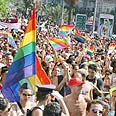
The debate over whether to hold the pride parade in Jerusalem put the conflict between the Orthodox and secular communities back in the limelight after years in which it seemed that it had subsided and lost its relevance.
As an ordinary citizen who followed this cultural war via the media, I feel that this time the homo-lesbian community went too far and in so doing lost support among the public in light of the community's insistence to hold the parade in Jerusalem of all places.
In recent years, the homo-lesbian community has achieved a great deal, achievements that could only have been imagined in the past. Does anyone still remember that homosexuality was deemed a criminal offense until the middle of the 80s? Since then, with the help of liberal elected legislators and opinion leaders, homosexuality has become a legitimate sexual orientation and the law that previously banned it now prohibits discrimination against same sex couples. Today, coming out of the closet is often deemed a promotional act. Politicians who in the past ignored the community are now seeking its company in the aim of securing their votes for the next elections.
In light of the community's success, the question of whether the parade was really necessary has often been asked, including by members of the community itself. Beyond the party atmosphere that breaks up the routine once a year, it doesn't convey any real message. And if this is the case, why does the community insist on celebrating its sexual orientations in Jerusalem of all places, a city with cultural characteristics very different to those prevalent in Tel Aviv?
Going one step too far
Even though they spoke of tolerance, the homo-lesbian community did not understand that they themselves were being intolerant not only towards Jerusalem residents, but also towards cultural traditions. They didn't understand that their conduct was not only offensive to the residents of Mea Shearim but also to the Christian and Muslim residents who view Jerusalem as a holy city in which sexual permissiveness should be prevented. Every city has its unique cultural traits; in Tel Aviv for example, a mass parade by born again Jews wouldn't have been looked upon favorably. Jerusalem is not a suitable place to hold a parade of a sexual nature.
When looking objectively at the status quo in Jerusalem, it is evident that those who demonstrated tolerance were in fact the residents of Mea Shearim. They have never paraded in the streets of Tel Aviv in protest of the pride parade being held there, and they took no measures to shut down the Open House and gay clubs operating in Jerusalem.
However, this year's pride parade was going one step too far, interpreted by the religious community as legitimizing something that is not at all crucial. Their willingness to accept the compromise proposed by the police shows that contrary to popular thought, agreements can be reached with them and that they are not blind to the goings on outside of Mea Shearim in the heart of the secular society.
The protest by the homo-lesbian community would have been understood had it asked to protest against a law that bans holding a parade or if a representative from a religious political party would have taken up the post at the Ministry of Education and Culture and proceeded to ban films of a homosexual nature.
A regime that prohibits the freedom of expression of same sex couples should be protested, but a people's protest coming from the various groups living in the city should be adhered to.
Had I been a member of the gay community, I would let the next pride parade be held in Tel Aviv.
David Fisher is the director of the New Israeli Foundation for Cinema and TV















